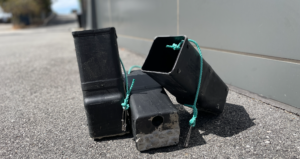
Our Octopus hides (or shelter pots as they are sometimes known) are economical, easy to use, as well as being easy to harvest. They are a moulded plastic tube that the octopus literally ‘hide’ in; and we fit them with ballast, a rope bridle and a snap hook.
Octopus traps or trigger pots, work differently to a shelter pot. They are more like a mouse trap – when the bait is taken, a triggers closes the lid. The lid then stays permanently closed until you pull your trap and clear it.
Our octopus hide’s have a single entry chamber that is ballasted at the bottom, so it rests upright on the ground. It allows the octopus to come and go freely.
The best spot for placing your shelter pot or hide is right in the middle of typical octopus feeding grounds, where there’s often not much shelter. Feeding grounds are often flat open areas of broken rubble, sand and seagrass meadows where the crabs, molluscs (like clams & mussels) and small fish live. If you place your shelter pots near a reef, they are unlikely to catch as there is plenty of natural habitat for the octopus to hide. Remember, we don’t recommend placing them anywhere near your craypots.
Advantages of Octopus Hides over Trigger pots
An Octopus Hide allows you to be a fair weather fisherman. In bad weather, trigger pots still need to be pulled, otherwise the octopus inside will starve. Shelter pots allow them to come and go, so you can wait until the swell drops.
Plus some of the other advantages of an octopus hide include:
- Much cheaper
- No maintenance requirements unlike trigger pots
- Don’t have to be regularly checked for trapped occi
- No limits on the number you can fish with
Tips for fishing for Octopus
If you’re new to catching Octopus, here’s a few tips that you might find helpful:
- You can fish in any depth but usually depths of between one to twenty metres is good.
- Look for areas that are flat, open, and with some broken rubble.
- Optimal times to pull is between 5-7 days
Want to know more? Read our blog on Octopus Fishing.



